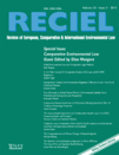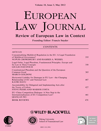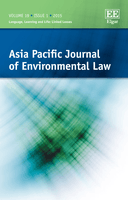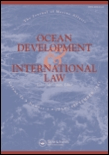
ECOLOGY LAW QUARTERLY
Scope & Guideline
Innovating the dialogue between law and ecology.
Introduction
Aims and Scopes
- Environmental Law and Policy Reform:
The journal consistently explores the need for reform in environmental law, advocating for legislative changes that reflect current ecological realities and challenges, such as climate change and biodiversity loss. - Climate Change and Legal Accountability:
A significant focus is on the legal implications of climate change, including litigation strategies, regulatory frameworks, and accountability mechanisms for both public and private entities. - Environmental Justice and Equity:
The journal addresses issues of environmental justice, examining how laws and policies disproportionately impact marginalized communities, and advocating for equitable access to environmental resources and protections. - Interdisciplinary Approaches to Environmental Issues:
The journal integrates perspectives from various disciplines, including economics, sociology, and public health, to enrich the understanding of environmental law and its implications for society. - Innovative Legal Mechanisms:
Exploration of novel legal frameworks and mechanisms, such as private ordering and community-driven initiatives, that can enhance environmental protection and resilience.
Trending and Emerging
- Climate Resilience and Adaptation:
Recent publications increasingly emphasize legal strategies for climate resilience and adaptation, highlighting the need for laws that facilitate community preparedness and response to climate impacts. - Corporate Responsibility and Environmental Accountability:
There is a growing trend towards examining the role of corporations in environmental protection, focusing on legal frameworks that promote corporate accountability for environmental harm and sustainability practices. - Public Health and Environmental Law:
The intersection of public health and environmental law is gaining prominence, particularly in the context of environmental justice and the impacts of pollution on vulnerable communities. - Technological Innovations in Environmental Management:
Emerging discussions on the role of technology in environmental law, including algorithm-assisted decision-making and data-driven policy frameworks, reflect an interest in utilizing modern tools for better environmental governance. - Indigenous Rights and Environmental Stewardship:
An increasing number of articles focus on Indigenous rights and their role in environmental stewardship, advocating for legal recognition of traditional ecological knowledge and practices.
Declining or Waning
- Traditional Regulatory Approaches:
There is a noticeable decline in articles focused on traditional regulatory frameworks, such as command-and-control regulations, as scholars explore more dynamic and flexible legal mechanisms to address environmental challenges. - Historical Analysis of Environmental Laws:
Themes centered on historical analyses of environmental laws and policies are appearing less frequently, possibly indicating a shift towards more forward-looking discussions that emphasize current and future challenges. - Land Use Law:
The focus on land use law, particularly regarding zoning and development regulations, has diminished, as interest pivots towards broader systemic issues like climate adaptation and resilience. - State-Level Environmental Policy:
Research on state-specific environmental policies is waning, possibly due to an increasing emphasis on national and global frameworks that address transboundary environmental issues. - Conventional Environmental Litigation:
The journal is seeing fewer articles on conventional environmental litigation, reflecting a broader trend towards exploring alternative dispute resolution mechanisms and innovative legal strategies.
Similar Journals

Review of European Comparative & International Environmental Law
Advancing global discourse in environmental law.Review of European Comparative & International Environmental Law is a leading academic journal published by WILEY that serves as a vital platform for scholars and practitioners in the fields of environmental law, geography, and policy analysis. With its ISSN 2050-0386 and E-ISSN 2050-0394, it provides comprehensive insights into the comparative and international aspects of environmental legislation and governance. The journal is noted for its rigorous peer-review process and has achieved commendable rankings, including Q1 in Law and Q2 in Geography, Planning, and Development in the 2023 category quartiles. Furthermore, it holds impressive Scopus rankings, placing it within the 92nd percentile for social sciences law. The scope of the journal encompasses interdisciplinary research addressing contemporary environmental challenges, making it an invaluable resource for those engaged in the development, monitoring, and policy-making around environmental law. Published since 2013 and continuing through 2024, Review of European Comparative & International Environmental Law plays a crucial role in fostering scholarly dialogue and influencing environmental policy worldwide, ensuring access to state-of-the-art research and innovative solutions for a sustainable future.

European Law Journal
Unveiling the socio-political dimensions of legal developments.European Law Journal is a prestigious publication dedicated to the exploration and critical analysis of legal issues across Europe, offering readers timely insights into developments in law and their socio-political implications. Published by Wiley, this journal has established itself as an authoritative source in the field of law since its inception in 1995, successfully converging research and scholarship through 2024. With an impressive impact factor and ranked in the Q2 category for Law, it occupies a significant position at #235 out of 1025 in Scopus, reflecting its influence within the social sciences domain. While the journal is not Open Access, it remains a vital resource for researchers, practitioners, and students seeking to deepen their understanding of European legislative changes and jurisprudence. The European Law Journal invites contributions that challenge conventional perspectives and stimulate discourse on contemporary legal challenges, making it an essential read for those at the forefront of legal scholarship.

UNIVERSITY OF NEW SOUTH WALES LAW JOURNAL
Connecting Scholars, Professionals, and Students in Legal StudiesUniversity of New South Wales Law Journal, published by the University of New South Wales, Faculty of Law, is a leading academic journal that serves as an essential platform for discourse in the field of legal studies. With an ISSN of 0313-0096 and an E-ISSN of 1839-2881, the journal has been a beacon of legal scholarship since its inception in 1983. Operating from Kensington, New South Wales, Australia, it provides profound insights into various legal issues, emphasizing interdisciplinary perspectives by also being recognized in the fields of philosophy, sociology, and political science. While it maintains a Q3 ranking in Law and has shown increased visibility in Philosophy at Q2 according to the 2023 category quartiles, the journal assures a diverse range of critical analyses from scholars, professionals, and students alike. It is particularly valuable for researchers seeking to engage with contemporary legal debates, ensuring they remain at the forefront of academic and practical discussions in law and related disciplines.

ALBERTA LAW REVIEW
Illuminating the complexities of law and justice.ALBERTA LAW REVIEW, published by the University of Alberta, stands as a key academic journal in the field of law, contributing to the discourse on legal issues and developments in Canada and beyond. With an ISSN of 0002-4821 and an E-ISSN of 1925-8356, this journal has been pivotal since its inception in 1974, providing a platform for legal scholarship that spans a diverse range of topics, from constitutional law to social justice. Although it operates under a traditional subscription model, the journal's illustrious history and rigorously peer-reviewed content affirm its stature in advancing legal research and education. The Alberta Law Review not only serves as a resource for academics and students, but also offers legal practitioners critical insights and analysis pertinent to contemporary legal challenges. With a commitment to enlightening the discourse around law, it is an invaluable asset for anyone engaged in the legal profession or related fields.

Asia Pacific Journal of Environmental Law
Bridging Legal Insights and Environmental StewardshipAsia Pacific Journal of Environmental Law, published by EDWARD ELGAR PUBLISHING LTD, serves as a vital platform for disseminating scholarly research in the field of environmental law within the Asia Pacific region. With an ISSN of 1385-2140 and an E-ISSN of 1875-8258, this journal primarily focuses on the intersection of environmental legislation, policy, and management practices, providing critical insights and analysis to enhance understanding and application of environmental law. Although it holds a Q4 ranking in the 2023 category of Management, Monitoring, Policy and Law, the journal's commitment to advancing knowledge and discussions surrounding pressing environmental issues remains strong. Converging insights from various years, the journal captures a range of developments and scholars' perspectives that address regional environmental challenges, making it a relevant resource for researchers, professionals, and students alike. While the journal currently does not offer open access options, its rigorous peer-reviewed process ensures the dissemination of quality research that contributes to the broader dialogue on environmental protection and policy development in this dynamic and critical field.

Tsinghua China Law Review
Exploring the intersections of Chinese and global law.Tsinghua China Law Review is an esteemed academic journal published by the Tsinghua University School of Law in China, dedicated to advancing the field of law through rigorous scholarly analysis and critical discourse. Established in 2019, this journal has carved a niche for itself within the legal community, striving to cover pertinent issues in Chinese law and its intersections with global legal trends. Although it retains an H-index disclaim and has discontinued its coverage in Scopus after 2024, it continues to provide a platform for innovative research and thought-provoking essays. Recognized for its contributions, it is categorized as Q4 in Law based on the latest ranking, positioning it at a pivotal juncture for emerging scholars aiming to make their mark within the legal scholarship landscape. With open access options limited, Tsinghua China Law Review remains a valuable resource for researchers, professionals, and students eager to engage with contemporary legal issues that shape society in an increasingly interconnected world.

University of Bologna Law Review
Fostering Innovative Legal Thought GloballyUniversity of Bologna Law Review, published by UNIV STUDI BOLOGNA, ALMADL JOURNALS, serves as a pivotal platform for legal scholars and practitioners in the field of law. Established as an Open Access journal in 2016, it has committed itself to disseminating high-quality research and fostering vibrant discussions around contemporary legal issues. Based in Italy, the journal addresses a broad spectrum of topics within the realm of law, enhancing its reach and applicability. Although it currently holds a Q4 ranking in the 2023 law category according to Scopus, this reflects its potential for growth and contribution to academic discourse. The journal’s h-index and precise scope will be developed as it continues to publish groundbreaking research up to 2024. With an aim to cultivate educational resources and foster innovative legal thought, the University of Bologna Law Review is an essential resource for researchers, professionals, and students alike, harnessing the power of open access to engage a global audience.

Environmental and Planning Law Journal
Fostering Dialogue on Legal Solutions for a Sustainable WorldEnvironmental and Planning Law Journal is a significant publication in the fields of law and environmental studies, published by LAWBOOK CO LTD in Australia. This journal, with the ISSN 0813-300X, has established itself as a crucial resource since its inception in 1984, providing a platform for scholarly discourse around legal frameworks affecting environmental planning and policy. Despite its coverage discontinuation in databases like Scopus, its impact remains recognized, achieving a rank of #455 in the Social Sciences Law category, indicating its relevance in legal scholarship. The journal is classified in the lower quartiles, yet it continues to address vital issues in geography, planning, and management of environmental law, engaging with contemporary challenges faced by policy-makers and practitioners. With no open access options currently available, the journal invites subscriptions and institutional access for its valuable content, making it a notable cornerstone for researchers, students, and professionals dedicated to navigating the complexities of environmental law and planning.

OCEAN DEVELOPMENT AND INTERNATIONAL LAW
Bridging Law and Ocean StewardshipOCEAN DEVELOPMENT AND INTERNATIONAL LAW, published by Taylor & Francis Inc, is an esteemed journal dedicated to the interdisciplinary study of ocean governance, environmental law, and international relations concerning marine resources. With an ISSN of 0090-8320 and an E-ISSN of 1521-0642, this journal serves as a vital platform for researchers, legal scholars, and policymakers interested in the evolving challenges of ocean development in a globalized context. The journal has established itself as a resourceful publication, evidenced by its ranking in the 2023 Scopus categories, where it is positioned in the 75th percentile for Law and the 66th percentile for Political Science and International Relations. Operating for over four decades, from 1973 until 2024, it is pivotal for advancing knowledge and fostering dialogue on critical issues such as environmental sustainability, international maritime policies, and legal frameworks governing the seas. Despite being a subscription-based journal, OCEAN DEVELOPMENT AND INTERNATIONAL LAW remains influential, offering significant insights that contribute to the development of effective legal instruments and governance strategies for oceanic resources.

International Community Law Review
Exploring the Intersection of Law and International Relations.International Community Law Review, published by MARTINUS NIJHOFF PUBLISHERS, is a distinguished journal that contributes significantly to the fields of law and international relations. With an ISSN of 1871-9740 and an E-ISSN of 1871-9732, this journal serves as a vital platform for scholarly discourse on issues pertaining to international law, promoting a deeper understanding and engagement with complex legal frameworks and global challenges. Currently classified in the Q3 quartile for Law and Political Science and International Relations, the International Community Law Review ranks 475 out of 1025 in the Law category and 386 out of 706 in Political Science, reflecting a moderate impact in the academic community. Though it does not currently offer Open Access, the journal's extensive coverage from 2007 through 2024 ensures that it remains a relevant resource for researchers, professionals, and students. Published in the Netherlands, this journal aims to foster the development of international legal thought, support academic research, and facilitate discussions that shape modern international legal practices.